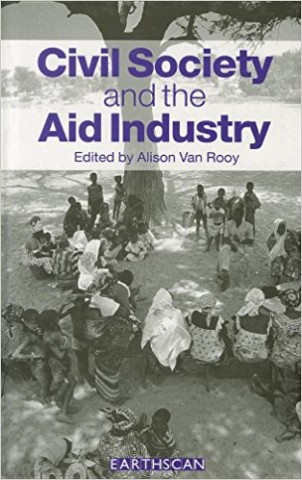Civil Society and the Aid Industry
Civil society is said to provide "the agents of change that will cure a range of social and economic ills left by failures of government and the marketplace: autocracy, poverty, disenfranchisement, oppression, social malaise. Cornucopian expectations for social change have been heaped on this idea and, indeed, for some Northern donors in particular (both official and non-governmental), the 'discovery' of civil society has promised a solution to the enduring problems of development and democratic change" (p. 1). With the rise of 'civil society' in research and practice in the 1990s, there was a great need to critically engage the questions being raised. An important book that arose to do just that was "Civil Society and the Aid Industry" (1998), edited by Alison Van Rooy. The book "chronicles one part of the story and highlights some of the promises and dangers that the language of civil society brings with it" (p.1).
The origin of 'civil society' thinking is deep: "there are two phases in the family history of civil society theory. The first, dating from the Romans, grappled with why and how humankind should be governed and under what conditions. From the Scottish Enlightenment in the eighteenth century, however, we see a line drawn starkly between the governed and the governors: all of a sudden, there is a State that needs to be defended against, and a civil society that harbours the citizenry and trains them to keep the State at bay" (p. 7). Due to 'civil society' being commonly used but rarely defined explicitly, there is "mix-and-matching from the centuries old debate on civil society" with the authors identifying six key perspectives utilized: civil society "as values and norms, as a collective noun, as a space for action, as a historical moment, as an anti-hegemonic movement, and as an antidote to the State" (p. 11-12).
While there are challenges, the contributors view civil society positively: "civil society is a good thing: many of the groups that interest us form to compensate for the failures of the State, the market or other parts of society to fulfill their aspirations. The idea assumes that a third sector is necessary to guarantee a just society" (p. 30). But, this is not a simplistic promotion of civil society. For example, they argue that "much of the literature frequently overlooks the ways in which the larger conflicts in political society are reproduced in civil society. The orthodox belief that civil society is an arena for negotiating interests, itself a touchstone of democratic deepening, masks the point that civil society can and often does feed into and aggravate existing social and political cleavages" (p. 136). As Ndegwa (1996) wrote about the 'two faces' of NGOs, the authors also outline the multiple faces of civil society: "Civil society has to be seen as an ad hoc melting pot and battleground of diverse interests and actors. This public arena is never homogenous; constituting itself as a permanent regrouping and renegotiating process. Its complex fabric and interwoven interdependencies are built on the voluntary will of individuals taking part in social and political affairs" (p. 76).
Fortunately, the authors provide not only assessment and criticism, but also suggestions for the way forward. This includes "broadening as well as deepening knowledge of African civil society; in particular understanding what might sap or energize it" (p. 166). It also means exploring indirect engagements by donors to "resume its role as an encouragement to existing movements for change, not the strong arm that sets them rolling" (p. 207). Along these lines, the book concludes that "if any project of social and political change is to be enduring it must come from the voices of local people" (p. 217). Other recommendations include understanding enabling environments, including the right to associate, the rule of law, a free press and other basic rights (p. 215). Importantly, it is being more explicit, open, reflexive and cognizant of the political nature of engaging with civil society: "The question is not whether politics can be avoided, but whether one's particular choice of political stance and partnerships can be justified and, if so, to whom" (p. 211).

